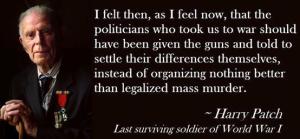world
Could this happen today? around 60,000 Australians obliterated in a distant war 100 years ago
You can’t study the history of politics and campaigning without being exposed to the historical facts around Australia’s past involvement in wars and how governments rose and fell during these conflicts in our recent history. Despite our relative isolation and peace, war has had a big impact on Australia’s past and its current psyche.
I respect current and past members of Australia’s armed forces and the sacrifices many have made in the past (and today) in the name of our nation. I think our many war memorials and ANZAC Day commemorations serve as an important reminder of the massive sacrifice that has been made by Australian service men and women in the past, sometimes in wars and conflicts they didn’t really understand or believe in. I’m also a firm believer in the need for a strong professional defence force that is capable of defending Australian interests here and abroad as well as assisting in humanitarian missions in warzones.
But as we approach the centenary of Australia’s involvement in WW1 (‘the Great War’, ‘The War to end all wars’, etc.) and the federal government starts spending the millions of dollars it has allocated to this anniversary, it’s worth asking the question would sending a large army to a foreign war be possible today? Would modern Australian society accept a slaughter of the same magnitude today as we did in 1914-18 and what would the public’s reaction be to a call to arms on such a large scale for a foreign conflict on the other side of the world?
I think it’s hard to judge these past decisions because we are culturally and educationally a different society now. It’s easy saying “it would/wouldn’t happen again” without explaining why. I suspect it couldn’t happen again unless we believed there was an existential threat to Australia. Back then, when our armed forces fought under a Union Jack and our national anthem was “God save the King” there was an existential threat to the UK and its allies from Germany. This threat to the “mother country” was all that mattered to many that enlisted and fought and died under the Union Jack and in Australia’s name.
I also wonder if Australia would have been a different place now, had those men and women who died 100 years ago been left to live, marry and have children? For a start, our population would be larger now and perhaps some of them would have been great leaders or scientists and business minds, but are now lost for eternity.
From the Australian War Memorial website we can see:
Enlistment statistics, First World War
Enlistments by State
Australian population 1914—1918: approximately 4.9 million
416, 809 Australians enlisted for service in the First World War, representing 38.7% of the total male population aged between 18 to 44.
| State | Number enlisted |
|---|---|
| Queensland | 57,705 |
| New South Wales | 164,030 |
| Victoria | 112,399 |
| South Australia | 34, 959 |
| West Australia | 32,231 |
| Tasmania | 15,485 |
Sources:
A.G. Butler, Special problems and services, Official history of the Australian Army Medical Services in the war of 1914—1918, vol III (Canberra: Australian War Memorial, 1943), p 890.
Commonwealth Bureau of Census and Statistics, Official yearbook of the Commonwealth of Australia, no 12, 1919 (Melbourne: Albert J Mullett, 1919).
At end of war
| Outcome | Number affected |
|---|---|
| died | 58,961 |
| wounded | 166,811 |
| missing or prisoners of war | 4,098 |
| suffered from sickness | 87,865 |
At almost 65%, the Australian casualty rate (proportionate to total embarkations) was among the highest of the war.

